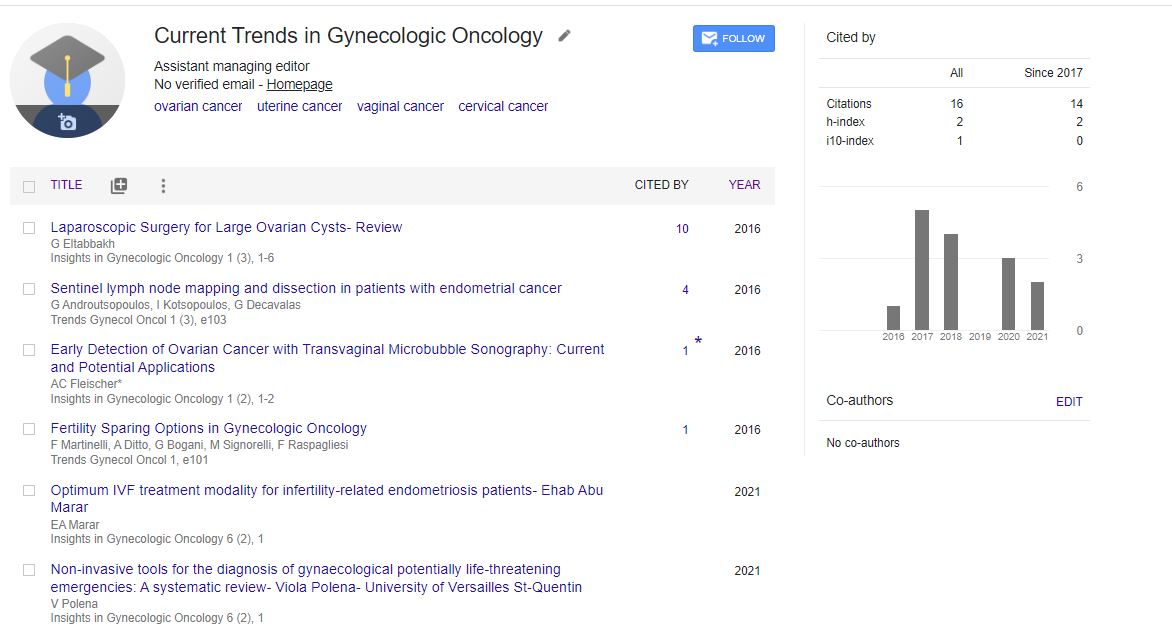Phytochemicals on Gynecological Cancers: Gynecologic Tumor Properties of Chinese Herbal Medicine Compounds and Nano-Formulations
*Corresponding Author: Jonathan Cagan, School of Biosciences, The University of Porto is a Portuguese public research university located in Porto, Portugal, Email: Cagan_jon@gmail.comReceived Date: Aug 01, 2023 / Published Date: Sep 30, 2023
Citation: Cagan J (2023) Phytochemicals on Gynecological Cancers: Gynecologic Tumor Properties of Chinese Herbal Medicine Compounds and Nano-Formulations. Current Trends Gynecol Oncol, 8: 171.DOI: 10.4172/ctgo.1000171
Copyright: © 2023 Cagan J. This is an open-access article distributed under the terms of the Creative Commons Attribution License, which permits unrestricted use, distribution, and reproduction in any medium, provided the original author and source are credited.
Abstract
Gynecological malignancies constitute cervical, uterine and ovarian cancers, with cervical cancer ranking as the second most common malignancy in women worldwide. Treatment results always depend on the stage of cancer corresponding to the extent of the disease and its metastasis. Common treatment options include surgical resection, chemotherapy, and radiation therapy. These treatment options may cause tumor recurrence or cause toxic effects. In addition, they develop dysregulated oncogenes and tumor suppressors. This inhibits apoptosis and enhances metastasis . In China, there are many different uses for traditional Chinese medicine (TCM), which also includes herbal remedies, acupuncture, and meditation. Recent years have seen the application of herbal compounds and active substances to slow the growth of tumors, ease pain, enhance quality of life, and lengthen the lives of cancer patients. Herbal medicine can be combined with radiotherapy, chemotherapy, or used as an adjuvant to boost the immune response to anticancer vaccinations in order to lessen adverse effects. Herbal medicine, in particular immunosuppressed tumor microenvironment, can have anticancer benefits by triggering the immune system. This article examines the developments in research on Chinese herbal medicine's anticancer immunomodulation, particularly the control of the innate immune system, which includes macrophages .To influence tumor-associated inflammation, MDSCs, natural killer cells, regulatory T cells (Tregs), and the adaptive immune system, which includes CD4+ T cells and CD8+ T cells, are all involved. Additionally, a combination of contemporary nanotechnology and active ingredients in herbal medicine alters the tumor immune microenvironment. Given that immunological antitumor therapy in TCM has recently been widely utilized both domestically and internationally, there is hope for continued clinical progress. The study of immune modulation mechanisms in Chinese herbal medicine, which will provide new insights on how herbs limit tumor growth and spread, will contribute in the advancement of tumor research.

 Spanish
Spanish  Chinese
Chinese  Russian
Russian  German
German  French
French  Japanese
Japanese  Portuguese
Portuguese  Hindi
Hindi 